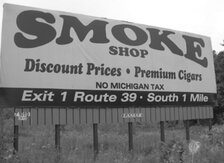
On Nov. 13, 2008, more than 150 law enforcement officers were involved in a major bust of 18 people involved in trafficking contraband cigarettes in the Detroit area. According to the Detroit Free Press, the smuggling ring involved "104,300 cartons of illegal cigarettes worth more than $2 million in unpaid Michigan taxes."
A new study by the Mackinac Center for Public Policy, "Cigarette Taxes and Smuggling," shows that this single bust — despite its considerable size — represents only a small portion of illegally trafficked cigarettes in the Great Lakes State. The study finds that in 2006 almost 35 percent of all the cigarettes consumed in Michigan (legal and illegal) were smuggled into the state, and smuggling is not the only unintended consequence of high state cigarette excise taxes. It has also contributed to crime ranging from vandalism to violence to terrorism.
Cigarette smuggling is a function of two primary variables: the "home state" cigarette excise tax differential and the distance to lower-tax jurisdictions. The home state customarily refers to the state into which cigarettes are smuggled. Michigan's excise tax is $2.00 per pack while Indiana's is less than half that amount and North Carolina is a mere 35 cents. Both states are sources of cigarettes for Michigan consumers but in two different ways: one involves "casual" smuggling, and the other "commercial" smuggling.
A casual smuggler crosses a state border seeking less expensive cigarettes for personal use. A 1995 report titled "Cigarette Smuggling in the State of Michigan" said that in July of that year Michigan police conducted surveillance of Indiana stores and in just four hours identified more than 180 Michigan residents who had purchased cigarettes and smuggled them back into the state. Commercial smuggling is a much larger operation and generally originates in tobacco states that have low excise taxes. In November 2007, a single arrest in Monroe County involved a van stuffed with an estimated 2,000 cartons in illegal cigarettes from Kentucky.
Private sales data of a large Midwestern distributor of cigarettes at the ZIP code level from January 2006 through September 2008 allows for tracking changes in sales to retailers in Michigan border counties, and by extension the sensitivity of retailers and consumers to tax-induced relative price changes.
After Indiana hiked its taxes by 79 percent in July 2007, sales to retailers on the Michigan side of the border leapt by more than 53 percent. Sales to Michigan retailers bordering Wisconsin also increased, though by a modest 8 percent, when that state increased its taxes 130 percent in January 2008. These numbers argue strongly that retailers and consumers in Michigan change their behavior when presented with relative changes in price. Smuggling became less attractive to consumers as other states raised their taxes.
But cigarette smuggling is not the only issue that must be considered when studying tobacco tax hikes. There are a host of unintended consequences involved for states choosing to dramatically hike excise taxes. For example:
Michigan should consider cutting its excise tax to reduce the frequency of all these crimes, or at the very least, raise excise taxes no further.
#####
Michael D. LaFaive is director of the Morey Fiscal Policy Initiative at the Mackinac Center for Public Policy, a research and educational institute headquartered in Midland, Mich. Permission to reprint in whole or in part is hereby granted, provided that the author and the Center are properly cited.

The Mackinac Center for Public Policy is a nonprofit research and educational institute that advances the principles of free markets and limited government. Through our research and education programs, we challenge government overreach and advocate for a free-market approach to public policy that frees people to realize their potential and dreams.
Please consider contributing to our work to advance a freer and more prosperous state.